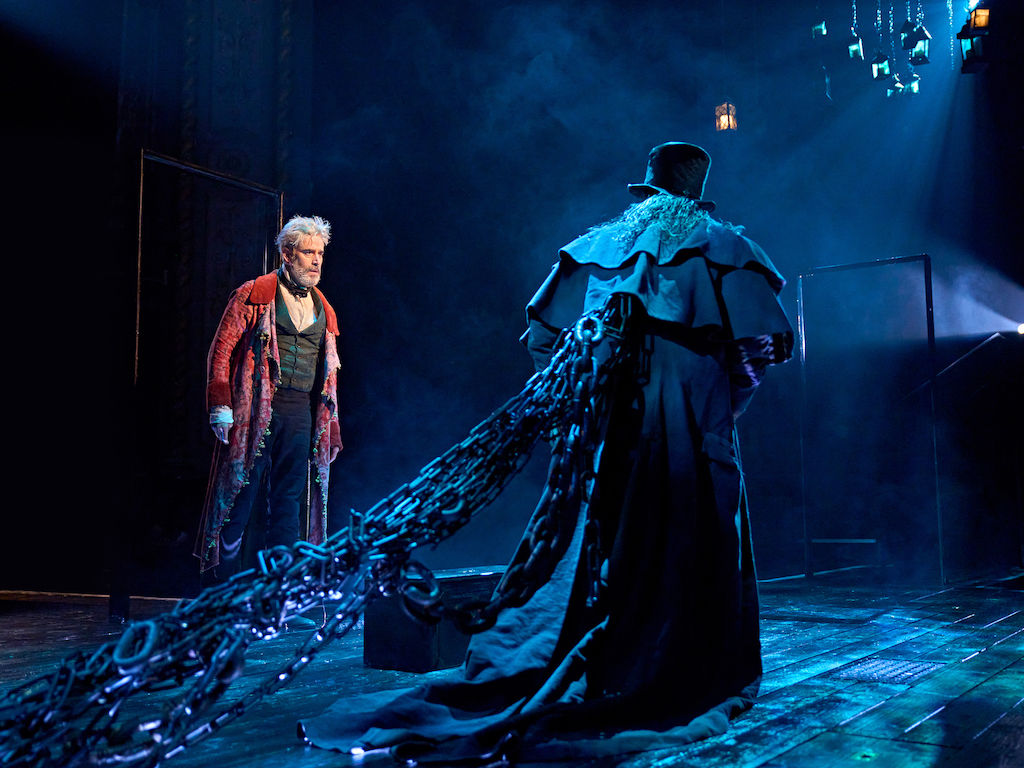Four years and a Broadway run on from its Old Vic debut, director Matthew Warchus and writer,Jack Thorne are still throwing everything they can at one of the most familiar stories, and characters, in English literature. That may be to address the obvious question of whether we need yet another three ghosts and an epiphany or whether it's playing a little too safe to displace Dickens's themes of Ignorance and Want 150 years or so into the past. Inevitably, we get some hits and some misses.
We're greeted with mince pies and by carollers in top hats and frock coats with - and I'm sure I'm not the only one who winced a little when I spotted them - bells at hand. I need not have feared since Christopher Nightingale's Tony Award-winning score and the traditional carols that intersperse the action prove to be a real highlight, Katherine Woolley's band and the company adding both a gothic vibe to the evening and a splendid Christmasy atmosphere - no mean feat in November.
 Stephen Mangan (pictured above) - with his Einstein hair and Dickens beard - provides us with an early "Bah! Humbug!" to satisfy the traditionalists and is soon laying on the misanthropy with a trowel. This is very much his show, on stage throughout, the loudest voice at any time (too loud too often, Scrooge's words need little emphasis to carry their force) but a compelling sight.
Stephen Mangan (pictured above) - with his Einstein hair and Dickens beard - provides us with an early "Bah! Humbug!" to satisfy the traditionalists and is soon laying on the misanthropy with a trowel. This is very much his show, on stage throughout, the loudest voice at any time (too loud too often, Scrooge's words need little emphasis to carry their force) but a compelling sight.
Mangan hangs on to the moneylender's bloodyminded pitilessness longer than is often the case, but that decision pays off with much the best scene in the production: an almost wordless showdown with Scrooge's neglected love, Belle. Karen Fishwick, in that role, brilliantly rations the glances over her shoulder at her front door, eyes darting back to the life she was forced to choose. It's a rare moment of understated acting amidst an often hectic set of performances.
The immersive element of the show gets off to a fine start with Jacob Marley literally dragging his chains through the house, a-clanking and a-scraping, an up close and personal manifestation of what happens when compassion is banished from a life. There's another marvellous coup de théâtre late on and some lovely singing from the gods, but the staging is more in the round than fully committed to the immersive format's potential.
With no set and few props beyond an imaginatively used set of boxes, the Ghosts of Christmas Past and Present need a real presence to frighten Scrooge out of his self-imposed emotional prison. Disappointingly, the ghosts we see are rather benign, friendly women (Amanda Hadingue and Rachel John) and even the scene in which the Cratchit family gather at the graveyard and Scrooge sees the inscription on the headstone is glossed over, passing by almost unnoticed. Without that shock, Scrooge's transformation is more of a slow burn and lacks the cathartic pivot that is the heart of the story.
Placing so much emphasis on Scrooge's interior life also squeezes out opportunities to develop other roles - his father is monstrous, his sister is saintly, Bob Cratchit is decent, Mr Fezziwig is supportive. Dickens' unsurpassed ability to sketch a vivid support cast for his protagonists is casually tossed aside, big characters boiled down to traits. That said, Rayhaan Kufuor-Gray (one of the four Tiny Tims listed in the programme) elicited plenty of "ahhs" from the house with a charming cameo, so that one worked for sure.
Ultimately the tone never quite settles. Rob Howell's costumes evoke the mists and grime of Victorian London, but the language keeps sliding into the 21st century which reminds us too often of where we are. The balance between scenes that show how Scrooge became the miser he was and then, shocked by the ghosts, is transformed into the philanthropist he becomes, tilt too far towards the former - I'm sure many will be left with the idea that Scrooge is still a bit of a villain. Mangan (and Thorne's script, to be fair) could give a little more attention to those in Scrooge's orbit, rather than the flawed hero demanding our attention relentlessly over the two hours.
Though it hardly needs saying, the ills that drove Dickens' social reformist anger, remain with us today. You may not meet many men called Ebenezer in 2021, but there's a few deserving of the name just across the river in the Palace of Westminster. Sentimental A Christmas Carol may be: irrelevant it is not.















Add comment